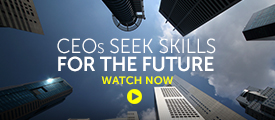According to PwC’s 18th Annual Global Survey, 61% of CEOs see more opportunities today than three years ago and 59% see more threats. We live in a dynamic world, business is being shaken up over and over again, but there are many ways in which business leaders can give innovation a place to shine in their organisations.
In this briefing four hospitality experts suggest that open-mindedness, flexibility, and investing in the right talent is key to success in an ever-changing world:
PwC’s survey of 1,322 CEO’s in 77 countries, found that 60% of CEOs are concerned about shifts in consumer spending and behaviours. A shift is certainly evident in the world of hospitality.
Having the right people in your organisation to be able to make the changes demanded by today’s consumer is important. It is also challenging. In PwC’s survey 73% of CEOs stated that they are concerned about the availability of key skills. This worry has been growing over the past years. According to PwC’s Global entertainment and media outlook 2014–2018, only 46% of CEOs had this concern in 2009. In 2010 this tipped over to 51% and by 2014 was at 63%.
The Being Digital Workforce Report from Accenture looks more closely at digital skills in organisations. It found that 44% of business leaders say a lack of digital skills is a key barrier to transformation. It also found that 49% of business leaders have a strategy for the management and development of skills and talent in a digital world, which means that just over half of leaders have yet to prepare for this need.
Digital technology itself is being more keenly embraced. In PwC’s survey 80% of CEOs said that mobile technologies and data analytics are key strands of their strategy.
If you’ve been sent to this page and you’re not yet on the circulation list to receive these regular briefings and you would like to sign up, you can do so here. It’s free.
Video clips produced by yBC for the Hospitality Channel, including interview from industry conferences such as the IHIF conference as well as specific Hospitality Channel shoots.


